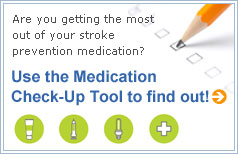The effects of a stroke vary from person to person: some people die, others recover completely, but many have effects that could last a lifetime.
Here's what could happen to you after a stroke:
| Death |
15% |
| Very severe disability (you will need long-term care) |
10% |
| Moderate-to-severe disability (you can function on your own but with difficulty) |
40% |
| Mild disability (your disability is inconvenient but does not have a major impact on your life) |
25% |
| Complete recovery |
10% |
A stroke can affect many different parts of your life, depending on the areas of the brain that were damaged:
| Type of problem |
What could happen? |
How could this affect my life? |
| Physical problems |
You could have weakness or paralysis along one side of your body, painful muscle spasms, vision changes (double vision or "blind spots"), difficulty swallowing, constant pain, poor balance, or a loss of fine motor skills (the ability to make small, precise movements). |
It might be harder for you to get around and do your usual activities. |
| Mental challenges |
You could have trouble speaking, understanding speech, remembering recent events, or learning and remembering new information.
You could also have personality changes, poor judgment, and impulsive behaviour. |
It could be harder for you to do your job and function day to day. |
| Emotional changes |
You may also feel frustrated, angry, depressed, or emotionally out of control. |
This could put a strain on your relationships. |
Some of these problems may improve over time. Stroke rehabilitation can help people regain some of the function they have lost and live life to the fullest.






